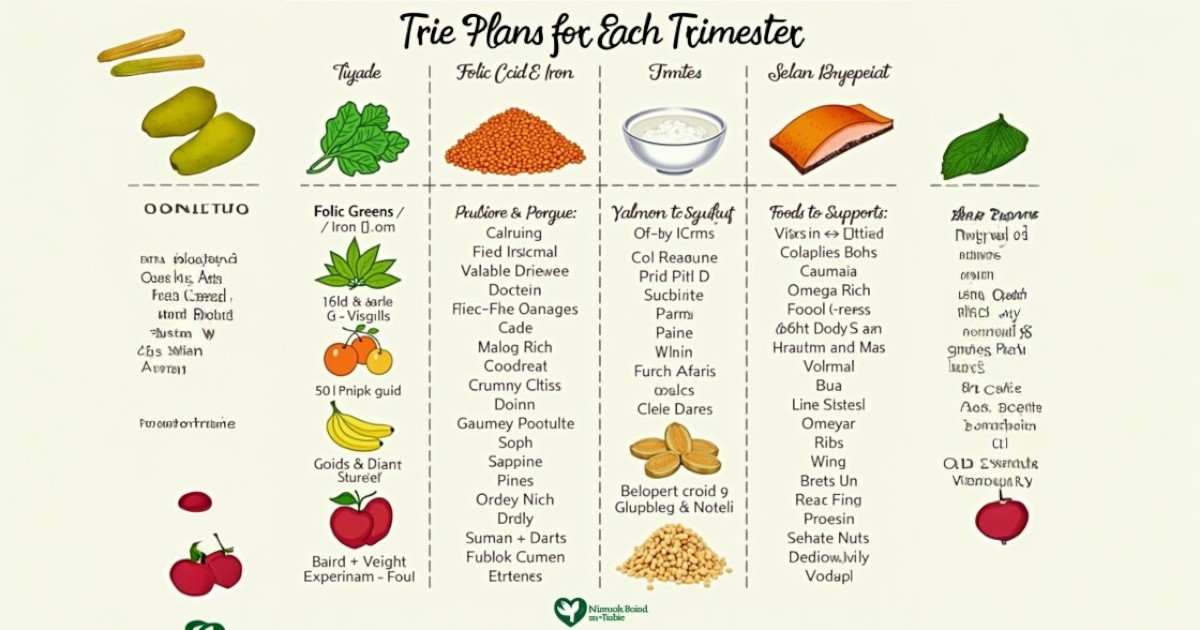
Healthy Diet Plans for Each Trimester of Pregnancy
Pregnancy is an incredible journey, but it often comes with its fair share of challenges—choosing the right diet being one of the most crucial. With a variety of conflicting opinions on pregnancy nutrition, it’s easy for expectant mothers to feel overwhelmed. The key to a healthy pregnancy lies in providing the right nutrients at the right time.
From managing morning sickness in the first trimester to preparing for labor in the final weeks, maintaining a balanced diet is essential for the health and well-being of both mother and baby. This article provides simple, trimester-specific diet plans that support maternal health, enhance fetal development, and keep mothers energized throughout their pregnancy.
The Importance of Proper Nutrition During Pregnancy
Good nutrition is vital during pregnancy as it ensures the healthy development of the baby while minimizing risks of complications like birth defects or delivery issues. An expectant mother’s calorie intake must increase, but these extra calories should come from nutrient-rich food groups.
Proper nutrition not only supports a mother’s changing energy needs but also alleviates pregnancy-related discomforts like nausea, fatigue, and constipation. Moreover, the long-term impact of a healthy diet extends to reducing a child’s future risk of obesity, diabetes, and heart disease. A nutrient-rich diet during pregnancy lays the foundation for lifelong health for both mother and child.
Healthy Diet Plan for Pregnancy: First Trimester
The first trimester is characterized by rapid cell division and the early development of the embryo. An intake of approximately 1,800 to 2,000 calories daily is recommended. Below is a detailed guide based on USDA recommendations to meet the specific nutritional needs of this stage.
Nutritional Requirements
- Folic Acid: Prevents neural tube defects and supports early fetal development.
- Iron: Prevents anemia and aids in the development of the baby’s brain.
- Calcium: Supports the skeletal development of the baby.
- Vitamin D: Enhances calcium absorption.
- Protein: Promotes fetal tissue growth.
- Fiber: Prevents constipation and aids digestion.
Daily Food Group Recommendations
- Fruits: 2 cups (e.g., apples, bananas, berries, avocados).
- Vegetables: 2.5 cups (e.g., dark leafy greens, broccoli, sweet potatoes).
- Dairy: 3 cups (e.g., yogurt, fortified plant milk).
- Protein: 5.5 ounces (e.g., lean meats, eggs, beans).
- Whole Grains: 6 ounces (e.g., whole-grain bread, cereals).
Foods to Avoid
- Raw or undercooked meat and eggs to reduce risks of listeriosis and toxoplasmosis.
Healthy Diet Plan for Pregnancy: Second Trimester
By the second trimester, the calorie requirement increases to 2,200–2,400 calories daily. This period is marked by rapid fetal growth and development, necessitating increased intake of essential nutrients.
Additional Nutritional Requirements
- Omega-3 Fatty Acids: Crucial for the baby’s brain and eye development.
Daily Food Group Recommendations
- Fruits: 2 cups
- Vegetables: 3 cups
- Dairy: 3 cups
- Protein: 6.5 ounces (include Omega-3 sources like fish and chia seeds).
- Whole Grains: 8 ounces
Foods to Avoid
- High-mercury fish (e.g., swordfish, king mackerel) to prevent mercury exposure.
Healthy Diet Plan for Pregnancy: Third Trimester
The third trimester focuses on the baby’s final growth spurt and preparing the mother’s body for labor. Calorie intake remains similar to the second trimester at around 2,400 calories daily.
Additional Nutritional Requirements
- Choline: Aids in cognitive development and supports the formation of the baby’s spinal cord.
Daily Food Group Recommendations
- Fruits: 2 cups
- Vegetables: 3 cups
- Dairy: 3 cups
- Protein: 6.5 ounces (include choline-rich foods like egg yolks and soy products).
- Whole Grains: 8 ounces
Foods to Avoid
- Processed foods and carbonated beverages to maintain optimal health.
Conclusion
While pregnancy diets should be tailored to individual needs, ensuring proper nutrition throughout the trimesters is critical for maternal health and fetal development. Nutrient-rich diets not only support a healthy pregnancy but also lay the foundation for a child’s long-term well-being.
In regions with high maternal mortality rates, organizations like Care Welfare play a pivotal role. Through initiatives like free C-sections, distribution of folic acid supplements, and medical camps offering ultrasound scans and gynecological checkups, they ensure deserving women receive the care they need. By supporting such causes, you can contribute to the health and well-being of mothers and their children.




